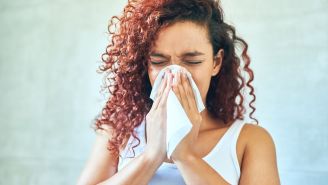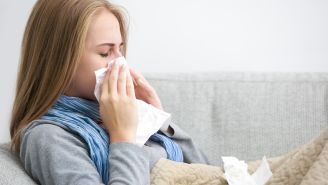Updated on March 27, 2024.
The flu can make you feel miserable. But most people recover and return to their normal routine in about two weeks. In some cases, however, more serious complications can develop. Certain flu symptoms, such as sudden dizziness or breathing problems, may signal a more serious medical problem, like sepsis (a life-threatening reaction to an infection) or pneumonia (an infection that affects one or both lungs). The flu also shares many symptoms with COVID, which can make it difficult to distinguish between the two.
Severe flu or COVID infections can lead to complications—even death. Knowing how to recognize warning signs of more serious infections can help save lives.
Typical flu symptoms
There are some telltale signs of the flu that most (but not all) people can expect to experience, including:
- Fever
- Chills
- Fatigue (tiredness)
- Muscle or body aches
- Headache
- Cough
- Stuffy nose
- Some people may have vomiting and diarrhea, though this is more common with certain strains of the flu and occurs more often among children than adults.
Most people with the flu will develop a fever, but not everyone does.
Generally, flu symptoms resolve in five to seven days, even without treatment. In some cases, symptoms can linger for up to two weeks. If they continue beyond that time frame it may be due to more serious complications of the flu. Among those at higher risk for complications: pregnant people, those with weakened immune systems, young children, seniors and nursing home residents as well as people with blood disorders, neurologic (brain) conditions, diabetes, severe obesity and chronic lung, heart, kidney or liver disease.
If you’re in a high-risk group, you should call a healthcare provider (HCP) if you develop symptoms of the flu. If you’re not at high risk for the flu but you feel very sick or worried about your symptoms, it’s best to visit your HCP. People with sick children ages 5 or younger should be sure to contact an HCP for advice about how to treat the flu, including antiviral therapy. Antiviral drugs could ease symptoms and help people recover more quickly or avoid serious complications if they are given one to two days after symptoms appear.
Recognize more serious warning signs
It’s important to recognize more serious flu-like symptoms. These signs may vary among people of different ages.
Worrisome symptoms among babies include:
- Trouble eating
- Fever
- Difficulty breathing
- Crying without tears
- Fewer wet diapers than usual
Additional serious symptoms among children include:
Breathing problems
Ribs retracting, or pulling in with breaths
- Bluish skin tone
- Muscle pain or chest pain
- Dehydration (dry mouth, no tears while crying, no urine for four hours)
- Difficulty waking up or interacting with others
- Increased or unusual irritability
- Seizures
- Worsening of chronic illnesses
- Improvement in flu symptoms to later return with fever and cough
- Fever above 104°F or a fever accompanied by a rash
Warning signs of more serious flu-related issues among adults include:
- Shortness of breath
- Abdominal discomfort, chest pain or severe muscle pain
- Sudden dizziness
- Severe weakness
- Confusion
- Extreme or persistent vomiting
- Worsening of chronic illnesses
- Flu-like symptoms that improve but then return with fever and worse cough
- Being unable to urinate
- Severe muscle pain
Anyone who develops these symptoms should call 911 or go to the emergency room. They could be a sign of a severe illness, such as pneumonia, an asthma attack, sepsis, inflammation of the heart or brain, or a severe case of COVID. If left untreated, these conditions can be life-threatening.
What to do if you get sick
Getting vaccinated against COVID, getting a seasonal flu shot, and practicing healthy habits can help you stay healthy. This includes:
- Washing your hands regularly
- Avoiding sick people as much as possible
- Trying to follow a diet that helps you get a variety of nutrients, such as eating more fruits and vegetables
But if you do get sick, here’s what you should do:
- Call an HCP if you have serious symptoms, or if you have an increased risk of flu-related complications.
- Stay home (unless you’re going to your HCP or the ER) and try to avoid contact with others.
- Try to get more sleep and rest.
- Stay hydrated. Check the color of your urine and how often you’re urinating—it should be clear to light yellow, and you should be urinating every three to five hours.
- If your HCP says it is safe and appropriate for you, take ibuprofen (Advil, Motrin, etc) or acetaminophen (Tylenol) if you have muscle aches or a fever.







